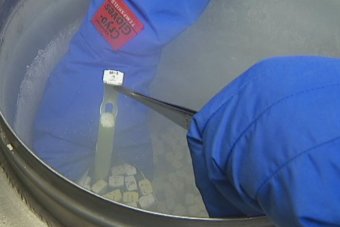IVF clinics could soon let prospective parents choose the gender of their baby, as the National Health and Medical Research Council considers allowing the choice.
Currently sex selection in Australia is banned, except for certain medical reasons, but the NHMRC is calling for public submissions on its draft guidelines that would potentially allow the choice for other reasons.
Couples are increasingly going to IVF clinics overseas so they can choose their baby’s gender, according to Australia’s Health and Ethics Committee.
IVF Australia’s medical director, associate professor Peter Illingworth, has spoken to some of those couples.
“The vast majority of couples who come for IVF do so simply to have a healthy child and are not concerned about the gender,” he said.
“But there is a small but significant number of couples who already have two to four children of one gender and would like to have the opportunity to balance their families for one reason or another, and sometimes these reasons can be quite significant, such as the loss of an existing child.”
At the moment, Australian couples can only select a baby’s sex if there is a serious genetic condition that will be passed to a child.
While parents can choose a variety of things for their children, I don’t think that their gender should be one of them at this stage.
Bob Phelps, Gene Ethics
Australian Health Ethics Committee’s chairman, Professor Ian Olver, is overseeing the review.
“We know there’s a number of Australians going overseas to seek it because it’s not available here,” Professor Olver said.
“It’s certainly something that people are beginning to talk about for things like, for example, family balancing.
“In Israel, for example, if you’ve had four children of the same sex, you’re allowed to petition the government to be able to choose the sex of the next one.”
Professor Olver said there is clearly a growing market for IVF sex selection, but no clear case on whether it is ethical.
“Well, it’s a polarising topic and I think there’s a tension between the rights if you like of parents, but also, we need to take into account particularly the effect that that may have on the child subsequently.”
Gender selection used to fit children into stereotypes: researcher
The Australian Health Ethics Committee is considering whether gender selection is a matter of freedom of choice or whether it could reinforce gender stereotypes.
Dr Tereza Hendl, a gender studies researcher from the University of Sydney, is opposed to the idea.
“It seems that these parents don’t just want a son or a daughter but they have a particular type of a son or a daughter in mind, so they assume that children will fit some particular quite stereotypical gender roles,” she said.
“We know that in any society there is a particular group of people who are gender diverse or transgender, and we should ask what will happen to these children if we legalise gender selection or section for non-medical reasons.”
The advocacy group Gene Ethics is also worried about the proposal, and cites China and India as countries where gender selection has gone wrong.
“While parents can choose a variety of things for their children, I don’t think that their gender should be one of them at this stage,” Gene Ethics director Bob Phelps said.
“I think in the broader picture that the sorts of problems that have arisen in India and China for instance, where the number of young men now vastly out numbers the number of women.”
But Associate Professor Illingworth said he believed it was time for medical guidelines to catch up with the fertility technology that is available.
“This is clearly and understandably a very important issue in the community and the use of these very powerful forms of genetic technologies undoubtedly does raise many concerns in the communities,” he said.
“But one of the issues is the fear that perhaps this might be done preferentially to support one gender rather than another.
“However, all the data that we have available suggests that the requests would be equally for boys and for girls.”
The Australian Health Ethics Committee will begin reviewing submissions on sex selection in the next two weeks.

